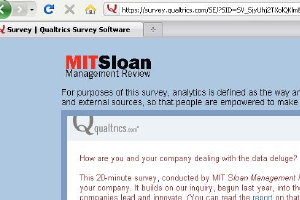Take the Survey: How Do You Handle the Data Deluge?
Does your company rely on intuition or analytics for decision making? Are the tech challenges less onerous than the cultural ones? Tell us your experiences in our second annual survey. You could win a free Apple iPad2.

Is your organization closed to approaches that challenge current practices?
How often do you have the analytics you need to make a good decision?
If you work with analytics, tell us your experiences in our second annual survey on analytics in the enterprise. As a thank you for completing the survey, we will enter you for an opportunity to win a free Apple iPad2.
One big question: What cultural challenges inhibit the use of analytics in your company? Unwillingness to share data internally? Power-based constraints? What about technology challenges? Like difficulty extracting info from unstructured sources such as email? Or difficulty integrating data across silos?
Our first survey, Analytics: The New Path to Value, was released last fall. This year we continue our inquiry into the “how” — how companies are overcoming challenges, how they can learn from others’ experiences. Take the new survey!

Comment (1)
AZIZ FIKRY MOHAMMAD